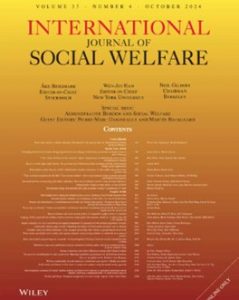Dros y blynyddoedd diwethaf, mae pwyllgorau seneddol olynol wedi argymell ehangu’r system fudd-daliadau ddatganoledig yng Nghymru. Yn 2024, cadarnhaodd Llywodraeth Cymru mai ei nod oedd: ‘Dull tosturiol a chyson sy’n canolbwyntio ar y person o ddylunio a darparu budd-daliadau yng Nghymru, wedi’i ategu gan egwyddorion Siarter Budd-daliadau Cymru‘ – yn cynnwys tosturi, cydraddoldeb a hawliau dynol. Mae angen amlwg am gymorth lles cynhwysfawr yng Nghymru. Mae data diweddar (2022-23) yn dangos bod 16% o’r holl oedolion yn dioddef o amddifadedd materol, gan gynnwys 19% o oedolion o oedran gweithio, 4% o bensiynwyr, a 9% o blant.
Astudiaeth newydd
Mae fy astudiaeth yn mynd i’r afael â’r prinder ymchwil ar y pwnc hwn ac yn cynnig amlinelliad systemig cychwynnol o System Fudd-daliadau Cymru (WBS), sydd ar gam cynnar yn ei datblygiad. Ei nod yw mapio ei pharamedrau, ystyried beth mae’n ei olygu, sut mae’n gweithredu, ei sail gyfreithiol a thrafodol, sut mae’n cymharu â datblygiadau yng ngwledydd eraill y DU, ac asesu’r heriau y mae’r llywodraeth bresennol yn eu hwynebu wrth geisio gweithredu ei haddewid o greu System Fudd-daliadau gydlynol i Gymru.
System fudd-daliadau Cymru
Ar hyn o bryd yng Nghymru, mae budd-daliadau nawdd cymdeithasol (e.e. Credyd Cynhwysol, Lwfans Ceisio Gwaith ac ati) yn cael eu gweinyddu’n bennaf gan Adran Gwaith a Phensiynau (DWP) Llywodraeth y DU. Ac eto, mewn perthynas â swyddogaethau datganoledig, gall Llywodraeth Cymru gynnig budd-daliadau ychwanegol i ddinasyddion yng Nghymru. Mae dau brif fath:
- Budd-daliadau Cymreig ‘annibynnol’ – y rhai sy’n berthnasol i ddinasyddion Cymru yn unig lle mae Llywodraeth Cymru yn gyfrifol am gymhwysedd, telerau a chyllid (e.e. Cynnig Gofal Plant Cymru, Cymorth Prynu – Cymru, Grant Cymorth Tai Llywodraeth Cymru ac ati).
- Budd-daliadau Cymreig sy’n ‘ychwanegu at’ fudd-daliadau DWP (e.e. o dan Strategaeth Llywodraeth Cymru ar gyfer gofalwyr di-dâl, mae gofalwyr sy’n derbyn Lwfans Gofalwr DWP yn gymwys i gael taliadau uniongyrchol o hyd at £500 i dalu am fwyd ac eitemau’r cartref. Mae gwasanaethau cymorth mewn nwyddau, fel cwnsela, cyngor ariannol, lles a chymorth cymheiriaid hefyd ar gael).
Mae canfyddiadau’r astudiaeth yn dangos bod budd-daliadau cyfredol Cymru yn helaeth ac yn cwmpasu llawer o swyddogaethau datganoledig, gan gynnwys iechyd, tai, gwasanaethau cymdeithasol, trafnidiaeth, addysg a sgiliau. Mae’r dadansoddiad yn dangos bod y fframiau allweddol yn y ddisgwrs bolisi ynghylch creu WBS yn cynnwys mynd i’r afael â stigma, annibyniaeth, cyfranogiad/cyd-gynhyrchu, grymuso, a gweithredu’n rhagweithiol.
Rhoi egwyddorion ar waith
Fodd bynnag, un diffyg yn nisgwrs bolisi WBS yw nad yw llawer o’r mynegiannau’n llawer mwy na geiriau rhethregol gwag. Yn aml, mae manylion ynghylch sut y bydd yr egwyddorion hyn yn cael eu cymhwyso i’r diwygiadau a addawyd yn anghyflawn neu’n absennol. Mewn cyferbyniad, rydyn ni ar dir cadarnach gyda’r trosiadau hawliau a chydraddoldeb. Y rheswm am hyn yw bod corff penodol o gyfraith ar gydraddoldeb a hawliau dynol yn berthnasol yng Nghymru; un sy’n wahanol i awdurdodaethau eraill y DU. Os caiff ei gymhwyso’n effeithiol, gallai hyn gael effaith gynyddol ar y ddarpariaeth o fudd-daliadau yn y dyfodol.
Mae’r dadansoddiad hefyd yn codi nifer o broblemau a heriau wrth wireddu nod presennol y llywodraeth o system fudd-daliadau integredig sy’n seiliedig ar hawliau. Un pryder allweddol yw nad oes digon o adnoddau a staff yn cael eu dyrannu i gyflawni graddfa’r diwygiadau sydd eu hangen. Nododd y dadansoddiad newydd dros 30 o fudd-daliadau datganoledig cyfredol, ond dim ond ar dri y mae gwaith peilot presennol yn cael ei wneud. Mae angen newid sylweddol ar frys yn yr arfer presennol hefyd gyda data’n cael ei rannu’n fwy effeithlon a systematig ar draws adrannau Llywodraeth Cymru, asiantaethau datganoledig ac awdurdodau lleol.
Mae ansicrwydd gwleidyddol yn fygythiad pellach
Mae polau piniwn cyfredol yn awgrymu cefnogaeth gynyddol i Blaid Cymru a Reform UK cyn etholiadau Senedd Cymru yn 2026. Ar ben hynny, wedi gyrfaoedd hir, mae nifer o uwch ffigurau yn y llywodraeth wedi dweud y byddan nhw’n camu i lawr yn yr etholiadau nesaf. Mae hyn yn codi cwestiynau ynghylch parhad a pherchnogaeth a goruchwyliaeth o gynlluniau WBS yn y dyfodol, ac a fydd yna ewyllys wleidyddol i barhau â’r diwygiadau drwy gydol y tymor seneddol nesaf.
Ni wyddwn a fydd WBS yn cael ei hehangu yn sgîl trosglwyddo budd-daliadau DWP yn y dyfodol. Yn y byrdymor o leiaf, mae’n ymddangos yn annhebygol. Yn rhannol, mae hyn oherwydd hanes o ddiffyg ymddiriedaeth ac ewyllys wleidyddol gan chwaraewyr feto yn San Steffan a phryder cyfiawn Llywodraeth Cymru fod unrhyw fecanwaith ariannu sy’n gysylltiedig â datganoli pellach yn sensitif i amddifadedd ac yn seiliedig ar anghenion yn hytrach na’r boblogaeth. Fodd bynnag, mae’r dadleuon ynghylch datganoli budd-daliadau ymhellach i wella atebolrwydd ariannol ac alinio gweinyddiaeth lles yn well â pholisi a chyfraith ddatganoledig yng Nghymru yn parhau’n bwerus ac mae’n bosibl mai’r rhain fydd yn drech yn y pen draw.
Deunydd darllen pellach

Gweler y canfyddiadau llawn yn y papur mynediad agored hwn:
Chaney, P. (2025) Examining the Contemporary Challenges of ‘Sub-state’ Welfare Development: The Case of the Nascent ‘Rights-Based’ Benefits System in Wales. International Journal of Social Welfare, John Wiley & Sons Ltd, ISSN ar-lein:1468-2397, ISSN print:1369-6866
Credyd llun: Welfare law gan Nick Youngson CC BY-SA 3.0 Pix4free

